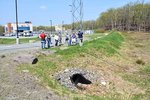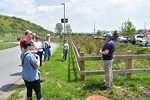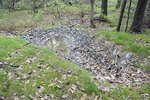 Narrowsburg
NarrowsburgLight Rain Fog/Mist, 43°
Wind: 8.1 mph
 Narrowsburg
NarrowsburgWhen it comes to protecting water quality in the Upper Delaware River region, best management practices (BMPs) are very important practices. This became exceedingly clear after the tandem events I …
Stay informed about your community and support local independent journalism.
Subscribe to The River Reporter today. click here
This item is available in full to subscribers.
Please log in to continue |



When it comes to protecting water quality in the Upper Delaware River region, best management practices (BMPs) are very important practices. This became exceedingly clear after the tandem events I experienced on May 15—a field tour of real examples of BMPs in Pike County, followed by the unusually destructive storm that decimated parts of the region later that evening.
Admittedly, BMPs are not the most exciting things to see on a bus tour. In fact, many of them go unnoticed and unappreciated, despite their crucial roles in maintaining the exceptional water quality we enjoy locally. Stormwater BMPs are actions, structures and techniques that reduce the adverse effects of stormwater runoff like that which occurred on May 15.
As runoff increases (typically due to increases in impervious or hard surfaces), surface water rushes into streams, causing less water to infiltrate the soil and reducing the replenishment of groundwater. Runoff also washes pollutants such as oil, gas, coolants, detergents, bacteria, pesticides and fertilizer into streams. Other negative impacts include streambank erosion and sediment deposit, damage to habitat and aquatic life, nuisance flooding and property damage, elevated stream temperatures and more.
The aim of utilizing BMPs is to minimize, slow down, infiltrate and filter stormwater runoff. Selection of the appropriate practices is based on site characteristics and stormwater management goals.
The tour was organized by the Pike County Conservation District (PCCD) and led by senior resource conservationist Ellen Enslin, certified professional in erosion and sedimentation control, with grant funding from the Pennsylvania Department of Environmental Protection. PCCD works to protect the county’s natural resources through education, technical assistance, planning and enforcement.
Learn how you can help to protect regional water quality by contacting PCCD at pikecd@pikepa.org or 570/226-8220 for a copy of the “Homeowners Guide to Stormwater BMP Maintenance” and other information.
Comments
No comments on this item Please log in to comment by clicking here